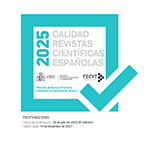Fake news on Facebook: narratives, circulation and verification. The cases of Argentina and Mexico
Abstract
This study looks into fake news that are produced and shared on Facebook. This research work assumes that fake news are narratives that maintain a close relation with the sociopolitical context where they are created and discursively voice the opinions of polarized audiences. It combines the analysis of the narratives with digital tools to study the circulation of the posts within this social network. This work examines and compares a sample of fake news made in Argentina and Mexico in relation to the narrative elements that build them, their link with the sociopolitical context, and their categorization according to both the intention and resources used in their production and circulation of later verifications. The study concludes that fake news are realizations of extreme enunciative positions on social media, expressed by means of a discursive creation based on the rhetorical figure of hyperbole.
Downloads
Article download
License
In order to support the global exchange of knowledge, the journal Estudios sobre el Mensaje Periodístico is allowing unrestricted access to its content as from its publication in this electronic edition, and as such it is an open-access journal. The originals published in this journal are the property of the Complutense University of Madrid and any reproduction thereof in full or in part must cite the source. All content is distributed under a Creative Commons Attribution 4.0 use and distribution licence (CC BY 4.0). This circumstance must be expressly stated in these terms where necessary. You can view the summary and the complete legal text of the licence.










